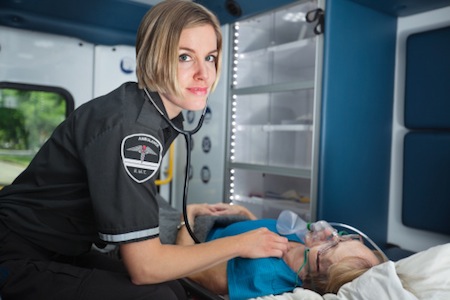Todd: So Meg, you are talking about being in the military, and you said you were a medic. Can you explain what that is?
托德:梅格,你說過你當過兵,你曾是醫護兵。你能解釋一下嗎?
Meg: Yeah. So a medic, which now I believe is called health care specialist, is – I always say it's kind of similar to being like a paramedic where it's not a full nurse job. I think nurses have more training like in civilian side nurses, but similar to paramedic where you have certain, like, minor procedures that you're trained to do and high-level things than just an EMT like doing IVs and giving shots and stitches and things like that. And you're trained – because it's the military, you're especially trained for emergency situations, and how to treat someone who has maybe some serious life-threatening wounds. So that's a medic.
梅格:好。我想現在醫護兵被稱為醫療保健專員,我一直說醫護兵和急救人員差不多,并不完全是護理工作。我認為護士,普通的護士要接受更多培訓,而急救人員在經過培訓后要能做小手術還有一些高級別的護理,而不僅僅是像緊急醫療技術員那樣,進行靜脈注射,拍片子或縫針等。要接受訓練,因為這是在軍隊,你要接受培訓以應對緊急情況,治療那些可能受了嚴重的傷有生命危險的人。這就是醫護兵。
Todd: Wow. That sounds like a really difficult job. I mean, it's not your typical, just soldier job. You must have had a lot of schooling and education.
托德:哇哦。那聽起來是個非常難的工作。你并不僅僅是服兵役。你一定接受過很多培訓和教育。
Meg: I had – well, everyone goes through the initial, about two and a half months like basic training. And that's more kind of basic combat skills and physical training that kind of thing. And then I had four months past that to train to be a medic. So we went through like emergency medical technician course just like civilian side. I got certified with that. And then we had additional training for the military skills like IVs and emergency procedures, that kind of thing.
梅格:沒錯,最開始,所有人都要完成兩個半月的基礎訓練。就是基本的戰斗技能和體能訓練。然后我進行了四個月的醫護兵培訓。我們要學習緊急醫療技術員課程,就像一般的急救人員一樣。培訓結束后我獲得了證書。然后我們還要接受額外的軍事技能培訓,比如靜脈注射和一些急救程序。
Todd: Right. Can you explain what IV is?
托德:好。你能解釋一下靜脈注射嗎?
Meg: IV is an intravenous – like getting fluids into your body. So if you've been injured and you've lost a lot of blood or maybe you're dehydrated and you need some fluid in your body quickly, then we stick a needle into your vein and then the fluids go in. And the needle comes back out but a little tube stays in. And then you can get fluids quickly that way.
梅格:靜脈注射,就是將液體輸入你的身體。如果你受傷了,失血過多,那你就會出現脫水,這時就需要將一些液體快速地注入你的體內,我們將注射針插入你的靜脈,然后將液體注入。將針取出,但是留下導管。這樣液體就可以快速流動了。
Todd: So anybody that's been to the doctor knows that's always kind of the anxious moment when the nurse or the person who's going to stick the needle in. Were you good at doing that?
托德:看過醫生的人都知道,護士打針的時候是最緊張的時刻。你擅長打針嗎?
Meg: So once I learned how to do it, I think I was pretty good. And I actually enjoyed doing it, not in a creepy way but, you know, it was – I guess, because I was decent at it that it was a part of my job that I enjoyed. But for myself, before we went through that training, I actually became dehydrated and needed to get an IV myself. And I was terrified because I really hadn't had that before in my life. And so, the nurse was going to come, you know, put the needle in my arm and I was like, "No, isn't there another? I'll just drink a lot of water." And she was saying, "Aren't you going to be a medic." And I was like, "Oh, I haven't trained yet. Don't do it." So yeah.
梅格:我學會以后,做得非常好。我其實很喜歡這個工作,那并不可怕,我做得很好,而且那是我工作的一部分,所以我很喜歡。其實,我在接受培訓以前,曾出現過脫水的情況,需要接受靜脈注射。當時我非常害怕,因為我之前從未經歷過。護士過來以后,打算將針頭插入我的胳膊,我問她:“有沒有其他方法?我多喝水可以吧。”她說:“你不是要當醫護兵嗎?”我回答說:“哦,我還沒接受培訓呢。不要給我注射。”就是這樣。
Todd: Oh, that's cool. Yeah. I was recently in the hospital and they had me strapped up for both blood and for the water, the intravenous drip. And it's annoying because you can't really move, like if you want to get up and walk anywhere, you're strapped with all these tubes. And it's not very convenient.
托德:哦,那太酷了。我不久之前去醫院了,他們給我止血包扎,還給我打點滴。那讓我覺得很煩,因為不能動,如果要起來走動,要一直帶著那些導管。非常不方便。
Meg: Yeah, yeah. Or at least you have to careful. When I was getting the IV, I didn't know that the needle doesn't stay in your arm. Now, for some things, it does. For blood, maybe it's different, I'm not sure. But yeah, so I was trying to be so careful too but you still want it to go well so you don't want to move very much.
梅格:對,沒錯。至少你要小心一些。我接受靜脈注射的時候,我不知道針不留在胳膊上。有些情況針是不取出的。不過治療出血,可能會有不同,我也不清楚。我盡量小心行動,我希望靜脈注射的效果能很好,所以我不會動太多。
Todd: Right. So what percentage of people would you say freak out when they get the needle?
托德:對。你認為有多少人在打針的時候會害怕?
Meg: Probably 90% or 95%.
梅格:大概90%或95%。
Todd: Oh really?
托德:真的嗎?
Meg: Yeah. Even, you know, tough Army guys would come in and be – and they'd be like, "Oh, I'm fine. I'm fine in a bit." "Well, we need to give you an IV." And they'd be like, "Oh..."
梅格:對,甚至軍人在接受治療時,一開始會說:“哦,我還好,我沒什么事。”當我們說“你要進行靜脈注射”時,他們的反應是“哦……”
Todd: Right. Yeah. Nobody likes that.
托德:對,沒有人喜歡打針。
Meg: No.
梅格:沒錯。
Todd: So you transitioned. You were in the medical profession and then you moved to education. Why did you leave the medical profession for education?
托德:你轉行了。你之前從事醫療工作,然后你轉向了教育業。你為什么離開醫療行業,進入教育界?
Meg: Yeah. That's interesting because I became a medic in the military because I thought after I – when I could continue college that I would be a nurse or a doctor. But my time serving as a medic helped me learn that that was not what I wanted to do for my career after all. So I definitely am glad that I had those skills and the things that I learned and was able to experience. But I had – English had kind of been on the back burner. And so then I said, "Okay, let me revisit this," and it led to English education.
梅格:對。這其實很有意思,因為我在軍隊是醫護兵,我當時以為我繼續大學學業以后會成為護士或醫生。可是,我在當醫護兵的時候,我意識到那并不是我想從事的行業。對于我掌握了這些技能、習得了一些經驗,我感到非常高興。那時我暫時擱置了英語教學,后來我想“我要重新開始英語教學”,所以我進入了教育界。
Todd: Wow. Have you ever thought about being like an English specialist for people in the medical fields like teaching doctors and nurses?
托德:哇哦。你有沒有想過成為醫學領域的英語專家,可以教醫生和護士?
Meg: I guess I haven't thought about that specifically. Sometimes I thought about going back to military. They do have something like English schools in the military. And so, I guess that would be related. Also it could be – yeah, so that would be interesting. Something to think about.
梅格:我想我并沒有想過那么具體的設想。有時我想回到軍隊中去。軍隊里也有英語學校。那是相關的。這可能也會很有意思。這可以考慮一下。
Todd: All right. Great. Thanks, Meg.
托德:好。太好了。謝謝你,梅格。

譯文屬可可原創,僅供學習交流使用,未經許可請勿轉載











